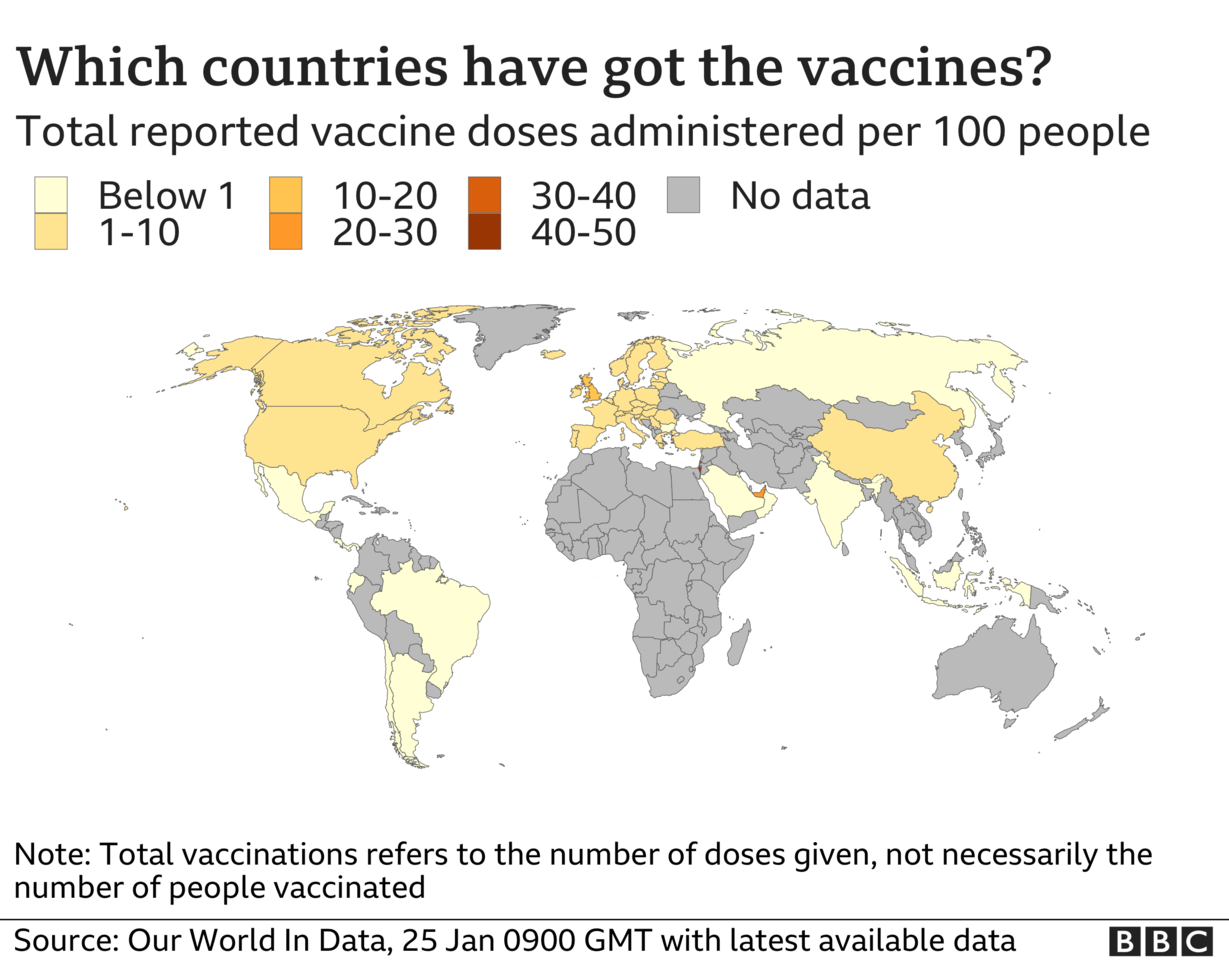
Coronavirus: EU demands UK-made AstraZeneca vaccine doses
The company has infuriated the bloc by saying it can deliver only a fraction of the doses it promised for the first quarter of the year.
It blames production issues at European plants, but the EU says doses made elsewhere should make up the shortfall.
The EU has been criticised for the slow rollout of its vaccinations.
A confidentiality clause binds AstraZeneca from releasing the details of its deal with the bloc, but the company reportedly said last week that the EU would get 60% fewer doses than promised for January-March 2021.
The EU reiterated its position after the two sides met on Wednesday evening to try to resolve the issue.
Health Commissioner Stella Kyriakides tweeted that the EU regretted the "continued lack of clarity on the delivery schedule".
"We will work with the company to find solutions and deliver vaccines rapidly for EU citizens," she said.
An AstraZeneca spokesman said the company had "committed to even closer co-ordination to jointly chart a path for the delivery of our vaccine over the coming months".
Pfizer/BioNTech, which has an even bigger vaccine-production deal with the EU, is also experiencing delays.
French drug maker Sanofi has announced that it will help produce 125 million doses of the Pfizer/BioNTech jab by the end of the year.
The company will allow Germany-based BioNTech to use its facilities in Frankfurt from July, Sanofi said in a statement, having delayed the development of its own vaccine.
What is the EU complaining about?
At a news conference earlier on Wednesday, Ms Kyriakides said UK factories, which have not experienced problems, were part of its deal with the company and had to deliver.
"The 27 European Union member states are united that AstraZeneca needs to deliver on its commitments in our agreements," she said.
In an interview on Tuesday with Italian newspaper La Repubblica, AstraZeneca CEO Pascal Soriot said the contract compelled it to make its "best effort", rather than obliging it to meet a set deadline for delivery of the vaccines.
Ms Kyriakides said this characterisation of the deal was "not correct or acceptable", and called on the company to be "open and transparent" about its production of vaccines.
"We signed an advanced purchase agreement for a product which at the time did not exist and which still today is not yet authorised and we signed it precisely to ensure that the company builds a manufacturing capacity to produce the vaccine early so that they can deliver a certain volume of doses the day that it is authorised," she said.
She added that the EU rejected "the logic of first-come first-serve".
"That may work at the neighbourhood butcher's but not in contracts, and not in our advanced purchase agreements."
She appeared to be responding to Mr Soriot, who said that the UK had signed its contract with AstraZeneca three months before the EU and that this extra time had been used to "fix all the glitches we experienced" regarding the UK.
Meanwhile, UK Prime Minister Boris Johnson said: "I'm confident of our supplies and we'll keep rolling out vaccines as fast we possibly can.
"I am very pleased at the moment that we have the fastest rollout of vaccines in Europe by some way."
A deeply unpleasant row

In a nutshell, here is why EU officials are furious with AstraZeneca. They say the contract between them and the pharmaceutical giant clearly stipulates that the two main vaccine production factories in the UK are to be classed as primary manufacturing sites, and the production sites in Belgium and the Netherlands are secondary priorities.
The vaccine production issues are in Belgium and the Netherlands (they have been producing lower yields). So, this is a no-brainer to EU officials - the UK sites should be used to transport the vaccines across the continent.
And today's impromptu news conference by the EU's Health Commissioner Stella Kyriakides shows that any tolerance of the company's previous explanations has worn thin.
In fact, EU officials point out to me that EU money went into upgrading the facilities in the UK and that they fully expected it to be operational for them. This has turned into a deeply unpleasant row, and sets the stage for a difficult meeting with the UK-Swedish company.
What are the supply problems?
The EU signed a deal with AstraZeneca in August for 300 million doses, with an option for 100 million more, but the company has reported production delays at two plants, one in the Netherlands and one in Belgium.
Mr Soriot said production was "basically two months behind where we wanted to be".
Italy was among the countries threatening to sue over the delays.

The AstraZeneca vaccine has not yet been approved by the EU, although the European Medicines Agency (EMA) is expected to give it the green light on Friday.
The EU had hoped that, as soon as approval was given, delivery would start straight away, with some 80 million doses arriving in the 27 nations by March.
Officials have not confirmed publicly how big the shortfall will be, but Reuters news agency reported that deliveries would be reduced to 31 million - a cut of 60% - in the first quarter of this year.
The EU has also ordered 2.3 billion doses of vaccines from four other companies, of which only those of Pfizer/BioNTech (600 million) and Moderna (160 million) have been approved.
Pfizer has not been able to supply the 12.5 million vaccines it promised the EU by the end of 2020, saying last week it was delaying shipments for the next few weeks because of work to increase capacity at its Belgian processing plant.
As a result of delays, on Wednesday Spanish officials said the Madrid region was halting almost all vaccinations for two weeks and supplies in Catalonia were also threatened.
The EU has threatened to restrict the exports of vaccines made within the bloc to deal with the shortfall.











